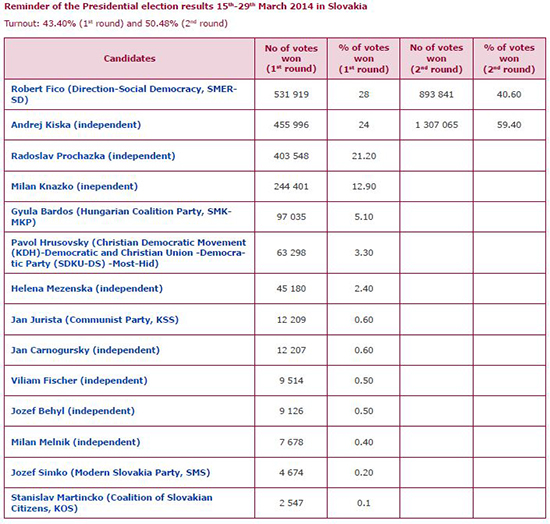Analysis
Elections in Europe
Corinne Deloy
-

Available versions :
EN

Corinne Deloy
On 10th January Andrej Danko (National Party SNS), leader of the National Council of the Republic (Narodna rada Slovenskej Republiky), the only house of parliament, announced that the Slovaks would be called to ballot on 16th March next for the first round of the presidential election. If none of the candidates running wins over half of the votes cast on that day (which is highly likely given the high number of people standing in this election), a second round will be organised two weeks later, i.e. on 30th March.
On 15th May 2018, outgoing President of the Republic Andrej Kiska announced that he did not want to stand for a second mandate.
The candidates
15 people are officially candidates in the presidential election on 16th and 30th March next:
– Bela Bugar, leader of Most-Hid (which means "bridge" in Slovakian and Hungarian), MP;
– Maros Sefcovic, supported by Direction-Social Democracy (SMER-D), Vice-president of the European Commission, responsible for energy;
– Ivan Zuzula, leader of the Conservative Party (SKS);
– Marian Kotleba, leader of Kotleba-People's Party-Our Slovakia (L'SNS), MP;
– Jozsef Menyhart, leader of the Hungarian Coalition Party (SMK-MKP);
– Milan Krajniak (We are one family, AME R), MP;
– Zuzana Caputova (Progressive Slovakia, PS);
– Robert Mistrik, independent, supported by Freedom and Solidarity (Sloboda a Solidarita, SaS) and Together-Civic Democracy (SPOLU);
– Stefan Harabin, independent, former Justice Minister (2006-2009) and former President of the Supreme Court (2009-2014);
– Frantisek Miklosko, independent, supported by the Civic Conservative Party (OKS), former member of the Slovakian National Council (1990-1992);
– Bohumila Tauchmannova, independent;
– Eduard Chmelar, independent;
– Juraj Zabojnik, independent;
– Robert Svec, independent;
– Martin Dano, independent.
Political context
The Slovakian political landscape is extremely fragmented and like many Europeans, voters are tending to reject the traditional parties during elections. This phenomenon was observed in the last local elections, which took place on 10th November last, notably in the country's biggest towns. Many inexperienced candidates were elected, like 31-year-old Marek Hattas, who was elected Mayor of Nitra (south-west of the country), or Matus Vallo, 41 who became the Mayor of Bratislava.
Peter Pellegrini (SMER-SD) has been Prime Minister since 22nd March 2018. He replaced Robert Fico, who, along with two of his ministers, was forced to resign, following the political crisis that followed the murder of journalist Jan Kuciak and his partner Martina Kusnirova at the end of February 2018. Jan Kuciak was investigating possible tax fraud and corruption in the political and economic circles for the news website www.aktuality.sk.
The independent candidates therefore have an advantage over those put forward by the political parties in the presidential election on 16th and 30th March. Likewise, although Maros Sefcovic does not hide the fact that Direction-Social Democracy suggested he run in the presidential election, he likes to say that he is not a member of this party himself and that he has distanced himself from it, even though it is taking part financially in his electoral campaign. "Today the question is not about whether we need a President of the Republic from a coalition or opposition. We do not need these incessant political conflicts. Slovakia needs a head of State who will contribute to national unity," the European Commissioner declared recently. "The country needs a president who is not partisan and who rallies a wide national reconciliation," he added.
According to the most recent poll undertaken between 7th and 12th February by Focus, Maros Sefcovic is due to come out ahead in the first round of voting with 20.1% of the vote, ahead of Robert Mistrik, who is due to win 17.1%. Zuzana Caputova is due to take 3rd place with 14.4%, Stefan Harabin is due to win 13.6%, Marian Kotleba 8.9%, Bela Bugar 7.4% and Milan Krajniak 6.3%. The 8 other candidates are due to win under 5% of the vote.
A second round between Maros Sefcovic and Robert Mistrik would witness the victory of the former but by a very short lead (50.8% of the vote and 49.2% for his rival). The campaign between rounds will probably be extremely intense.
The presidential function in Slovakia
The president of the Slovakian Republic has little power. He is elected for 5 years and is the commander of the armed forces; he negotiates and ratifies international agreements, promulgates laws and can grant amnesties.
Anyone who wants to stand for the supreme office has to collate at least 15,000 voter signatures or have the minimum support and signature of 15 MPs.

Source : http://volby.statistics.sk/prez/prez2014/Prezident-dv/def-sk.html
On the same theme
To go further
Elections in Europe
Corinne Deloy
—
15 April 2025
Elections in Europe
Corinne Deloy
—
25 February 2025
Elections in Europe
Corinne Deloy
—
18 February 2025
Elections in Europe
Corinne Deloy
—
28 January 2025

The Letter
Schuman
European news of the week
Unique in its genre, with its 200,000 subscribers and its editions in 6 languages (French, English, German, Spanish, Polish and Ukrainian), it has brought to you, for 15 years, a summary of European news, more needed now than ever
Versions :



